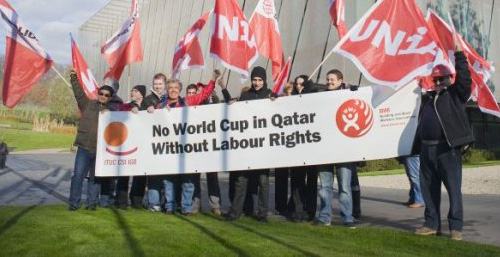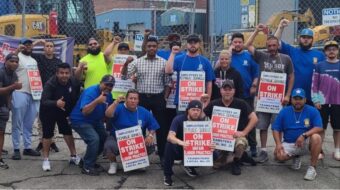
Qatar is a key U.S. ally in the Middle East, yet the majority of its population are immigrant workers who are harshly exploited with few rights.
Thousands of these exploited immigrants will be working on massive construction projects in Qatar to prepare for the 2022 World Cup, the premier event for the world’s most popular sport – soccer, known globally as football. Qatari leaders hope it will make the country a tourist focal point. As part of its successful bid to host the event, Qatar pledged to build nine new stadiums and refurbish three others within the next 10 years. It will also be spending billions on infrastructure upgrades.
But the International Trade Union Confederation, Building and Wood Workers International and the Swiss union Unia have told soccer’s international governing body, FIFA (Fédération Internationale de Football Association), that unless Qatar upholds labor rights, the world trade union movement will campaign against the World Cup being held there.
Leaders of the three labor bodies met with FIFA General Secretary Jerome Valcke last fall to inform him of this.
ITUC General Secretary Sharan Burrow said the union confederation “has made it clear to FIFA that the international union movement will not accept people working to build stadiums without respect for workers’ rights.”
“Migrant workers in Qatar have no labour rights, wages are exploitative and occupational health and safety risks are extreme. Qatar is a country wanting to gain acceptance from the global community of governments but refuses to acknowledge their treatment of migrant workers,” Burrow said. If this “extremely wealthy nation” wants to host such a major international event, “we expect civilized treatment of workers,” she said.
An extensive report titled “Hidden Faces of the Gulf Miracle,” published last year by the ITUC, presents shocking information about the conditions of workers in Qatar and its Persian Gulf neighbor Dubai.
Of Qatar’s 1.7 million residents, only 200,000 are native Qataris. Only 6 percent of the workforce is Qatari. Some immigrants are company owners and managers. But the country’s economy and vast wealth – for a minority at the top – is dependent on the labor of hundreds of thousands of migrant workers mostly from south Asia, the Philippines and more recently East Africa, the report says.
This “army” of workers has been lured from developing countries to the oil-rich nations of the Gulf “on a promise of fat wages,” says the report. When they arrive, they find the pay is much less than promised and is often issued months late.
And the conditions are slave-like:
“Far from the air-conditioned malls and beachfront condos, they inhabit overcrowded barrack-like housing, in sprawling, dust-clogged, male-only suburbs.
“Bussed home exhausted after long hours working in often blistering heat, the men are squeezed into up to ten to a room in company accommodation. Food is basic, sanitation often rudimentary and air-conditioning when it exists is sometimes ineffectual when summer temperatures soar over 40˚C (104 degrees Fahrenheit).
“Many work at dangerous jobs with little or no health insurance.”
They are required to get permission from their employer in order to switch jobs, and bosses often hold onto their passports to prevent them from leaving before the end of their work contract.
While the migrants are overwhelmingly male, there are also thousands of women migrants working as domestic servants. In addition to wage theft, they also encounter sexual abuse.
These workers are essentially held hostage. Collective bargaining and the right to strike are officially legal in Qatar, but “conditions and restrictions severely limit the scope of bargaining and effectively neutralise the right to strike,” the report says. Moreover, “public servants, domestic workers and those in ‘essential services’ such as health, transport and the oil and gas sector are banned from striking.”
Qatari officials say they plan to improve conditions for migrant workers, including model housing complexes and tighter laws to prevent abuse such as late salary payments or loan-sharking by recruitment agencies.
However, says the ITUC report, “there is little sign that they are willing to reverse laws which effectively deny trade union, collective bargaining and strike rights to migrants.”
That is why labor organizations stress pressure on FIFA and “Western companies lining up for lucrative World Cup contracts” to ensure that workers in Qatar get decent wages and conditions as well as labor rights.
Qatar, a big oil producer, also has the world’s third largest natural gas reserves.
It has very close ties with the U.S. – some say it serves as a “proxy” for the U.S. in the Middle East. As the State Department puts it, “Qatar and the United States coordinate closely on regional diplomatic initiatives.” Qatar “played an important role in the first Gulf War and the 2011 revolution in Libya, and … has supported U.S. military operations critical to the success of Operation Enduring Freedom and Operation Iraqi Freedom.”
The U.S. Central Command and Air Force Central Command are based in Qatar. It has housed fighter planes and fuel tankers used in the Iraq and Afghanistan wars.
Qatar’s massive exploitation of migrant workers goes unmentioned in the State Department “background note.”
Photo: ITUC
.










